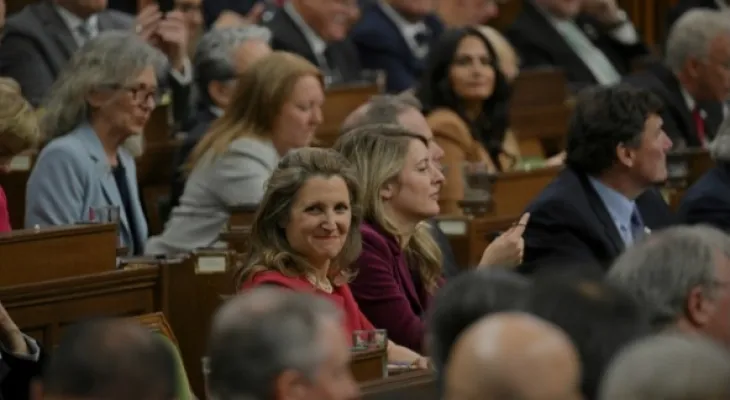Search here
Newspaper
Search here

Arab Canada News
News

Published: March 28, 2023
In the federal budget for 2023, the government revealed continued spending on public healthcare and the clean economy.
The federal deficit is also expected to reach $40.1 billion in 2023-24, nearly $10 billion more than forecasted in last fall's economic snapshot. The economic slowdown and new liberal spending are behind this increase.
From affordability measures for low-income Canadians and funding the next phase of the national dental care program to a range of green technology incentives, today's federal budget on Tuesday outlines the Liberals' plan to "make significant changes" while eyeing a potential recession.
This economic roadmap from Deputy Prime Minister and Finance Minister Chrystia Freeland details how the Liberals plan to spend nearly $70 billion from now until 2027-28, offset by about $25 billion in cuts and savings.
Speaking with reporters inside about the budget, Freeland acknowledged that some initiatives are "expensive," but she said she is ready to "face" anyone questioning the necessity of the spending outlined today.
Framing the 2023 budget as a plan to strengthen the middle class, support an affordable economy, and generate a healthy future, the Liberals present this budget as one about choosing how to shift the dial to boost growth with manageable spending without worsening inflation.
Among the notable measures in the 2023 budget:
$2.5 billion for a Goods and Services Tax (GST) credit issued as a "grocery discount"
$46.2 billion for federal, provincial, and territorial health deals
$13 billion to expand the federal dental plan by 2 percent
$4.5 billion imposed as a 30 percent tax credit on clean technology manufacturing
$15.4 billion in savings from public service spending cuts
The budget, titled "A Made-in-Canada Plan," shows the federal deficit is expected to reach $43 billion this fiscal year. Instead, the deficit is scheduled to gradually decrease over the next five years but still remain steady at $14 billion in 2027-28.
As economic precariousness continues and eliminating the deficit remains off the table for now, the Liberals continue to adhere to the debt-to-Canadian GDP ratio as the main fiscal barrier, despite its short-term rise.
Affordability, health measures, and travel fees:
As indicated before the budget release, the federal government will provide a one-time "grocery discount" costing $2.5 billion to help 11 million low- and modest-income Canadians pay their bills.
It is not required to be spent in a grocery store, as the discount is provided through the GST credit system, with eligible couples with two children receiving a payment of up to $467. Seniors will receive $225, while single individuals will receive $234.
The budget also includes the federal government's commitment to spending $46.2 billion more than previously allocated for healthcare, as agreed through deals with provinces and territories for significant improvements in patient care and access.
Regarding expanding coverage, the government also plans to spend $250 million over three years to create an "Oral Health Access Fund" to address gaps in access for vulnerable populations and those living in rural and remote communities.
A few other health-focused measures highlighted in this budget include:
$45.9 million over four years to expand the 2022 budget initiative that provided a 50 percent increase in the maximum exemption on Canadian student loans for doctors and nurses working in underserved rural or remote communities; $158.4 million over three years to support the implementation and operation of the new 988 suicide prevention hotline championed by a Conservative MP; and $359.2 million over five years to combat the opioid crisis through renewing Canada's drug and substance strategy.
In the budget, the Liberals pointed to a range of new measures focused on air travelers, including advancing commitments to compensate airlines, providing the Canadian Air Transport Security Authority (CATSA) with $1.8 billion over five years to accelerate processing times and enhance them.
Comments